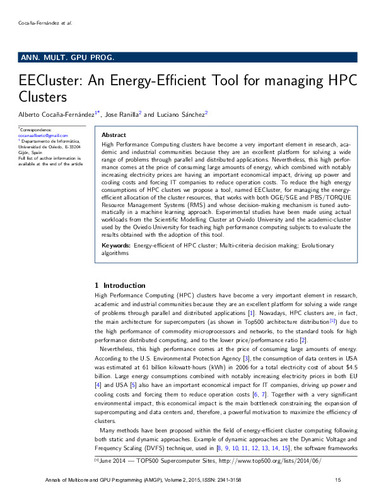EECluster: An Energy-Efficient Tool for managing HPC Clusters
Autor(es) y otros:
Fecha de publicación:
Citación:
Descripción física:
Resumen:
High Performance Computing clusters have become a very important element in research, academic and industrial communities because they are an excellent platform for solving a wide range of problems through parallel and distributed applications. Nevertheless, this high performance comes at the price of consuming large amounts of energy, which combined with notably increasing electricity prices are having an important economical impact, driving up power and cooling costs and forcing IT companies to reduce operation costs. To reduce the high energy consumptions of HPC clusters we propose a tool, named EECluster, for managing the energy-efficient allocation of the cluster resources, that works with both OGE/SGE and PBS/TORQUE Resource Management Systems (RMS) and whose decision-making mechanism is tuned automatically in a machine learning approach. Experimental studies have been made using actual workloads from the Scientific Modelling Cluster at Oviedo University and the academic-cluster used by the Oviedo University for teaching high performance computing subjects to evaluate the results obtained with the adoption of this tool
High Performance Computing clusters have become a very important element in research, academic and industrial communities because they are an excellent platform for solving a wide range of problems through parallel and distributed applications. Nevertheless, this high performance comes at the price of consuming large amounts of energy, which combined with notably increasing electricity prices are having an important economical impact, driving up power and cooling costs and forcing IT companies to reduce operation costs. To reduce the high energy consumptions of HPC clusters we propose a tool, named EECluster, for managing the energy-efficient allocation of the cluster resources, that works with both OGE/SGE and PBS/TORQUE Resource Management Systems (RMS) and whose decision-making mechanism is tuned automatically in a machine learning approach. Experimental studies have been made using actual workloads from the Scientific Modelling Cluster at Oviedo University and the academic-cluster used by the Oviedo University for teaching high performance computing subjects to evaluate the results obtained with the adoption of this tool
ISSN:
Patrocinado por:
This work has been partially supported by “Ministerio de Economía y Competitividad” from Spain/FEDER under grants TEC2012-38142-C04-04 and TIN2011-24302
Número de la patente:
Colecciones
- Artículos [37541]
- Informática [875]
- Investigaciones y Documentos OpenAIRE [8416]
Ficheros en el ítem




